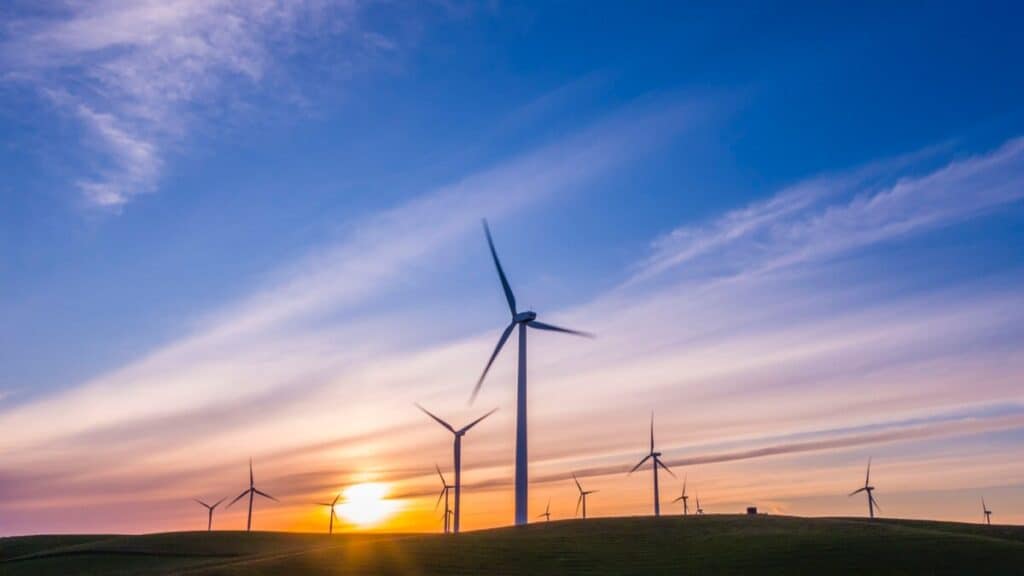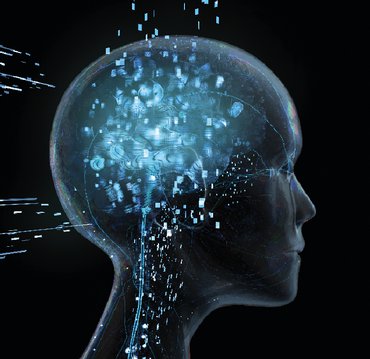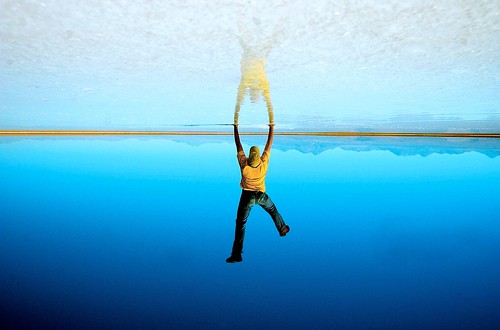Imagine if humanity chose to take a more sustainable path. How would we describe the previous decades looking back from the Year 2050?
Philosophers, mystics and spiritual leaders throughout the ages have made a distinction between the inner world and the outer (while acknowledging that any such distinction is merely an illusion!). The 20th century could be characterized as the century dedicated to “perfecting and manifesting the outer, material world.”
What Was the Majority Worldview at the End of the 20th Century?
At the risk of oversimplification, the majority worldview could have been stated as; “What you see is not only what you get — its all there is! Material wealth supersedes all other measures.” We might be tempted to describe the 20th century as “tall on innovation and intellect but short on wisdom.”
It became painfully obvious during the early decades of the 21st century, that wisdom had been relegated to the back of the line, behind fame, fortune, good looks, influencer status, and a bad attitude (and worse yet, a big gun). Everyone in the world experienced a series of wake-up calls in 2021 when confronted by Trump’s Big Lie, subversive acts by a sitting US president, the storming of the US capitol, and the unrelenting Covid-19 pandemic.
At the beginning of the third millennium we found ourselves staring through eyes of flesh and blood at the barren, unyielding wall constructed from a strictly mechanical world view bolstered by total disconnection from reality. We had come about as far as cold, calculated market thinking alone could take us without causing irreparable harm to ourselves and to our natural world.
And then what emerged was a weird perspective that “alternate facts” could replace truth and evidence based on good science. Scientific reasoning was shoved out the window by the marginal intellects of populist leaders.
One might ask, “what was the determining influence in successfully shifting humanity’s course from impending environmental and social breakdown towards a sustainable and more harmonious existence with one another and all life on earth?”

There were, of course, inestimable numbers of influences, however, in a nutshell, the defining shift took place, not in the outer world, but in human consciousness. Looking back on this period, many have called this “the Great Unlearning.”
How Did Wisdom Emerge?
As we all know, people in the early decades of the 21st century were suffocating under the weight of rapidly accumulating information — Zoom meetings, e-mails, twitter feeds, social media, YouTubes, and endless video streaming.
Increasingly suffering from the stress of overload, people began to shake their heads wondering if “info-bingeing” was what life was really all about. Like T.S. Eliot, they began to wonder, “Where is the knowledge we have lost in information? Where is the wisdom we have lost in knowledge?”
With heads crammed full — people found themselves feeling more empty than ever before. With bittersweet irony many realized they were living a life best described by the popular board game, Trivial Pursuit!
More and more people felt like they were “dancing with an elephant” and powerless to influence either the music or the dance! The teachings of the masters and sages — from Jesus and Buddha to Gandhi and Mother Teresa — where inspiring but often paradoxical. They all seemed to say the same thing: that the way to true inner peace and understanding — the way of radical transformation — could only begin with the emptying of the mind of all the accumulated garbage!
“To be independent in this true sense, we have to forget everything which we have in our mind and discover something quite new and different moment after moment. This is how we live in this world. So we say true understanding will come out of emptiness.
When you have something in your consciousness you do not have perfect composure. The best way towards perfect composure is to forget everything. Then your mind is calm, and it is wide and clear enough to see and feel things as they are without any effort.”
— Zen Master Shunryu Suzuki
Change Begins With Taking Out the Garbage
Throughout history, the extraordinary significance of this understanding had eluded the vast majority of human beings. However, in the years post-Trump, sufficient numbers of people experienced glimmers of doubt, realizing that the true state of the world smelled very fishy.
Catching up with the empirical proof of both mystics and leading-edge scientists, average people began to understand that the very act of observing the world around us creates our reality. Humanity suddenly found itself at a new threshold when enough people realized that, in fact, separation (I versus the world) is an impossibility and has always been an illusion created by our minds to try and bring order and understanding to an infinite, chaotic universe.
This is the realization that our minds are filled with garbage of our own making. Once we have a better handle on how this garbage colors our view of the world we can begin to filter out the garbage in favor of truth and beauty. The beauty that is reality.
In an article in Scientific American in 1979 Bernard d’Espagnat wrote, “The doctrine that the world is made up of objects whose existence is independent of human consciousness turns out to be in conflict with quantum mechanics and with facts established by experiment.”
Common Understandings that Led to a Sustainable Future
What follows is a brief overview of the common understandings that unfolded and swept the world during the third and fourth decades of the third Millennium, leading to “The Great Unlearning” followed by the “Giant Leap Towards Sustainability” that we are experiencing today, half-way through the 21st century.
ADAPTATION
Like all life forms, human beings and, therefore, human consciousness is changing and adapting.
CONSCIOUSNESS UNFOLDS
Just as individuals mature in consciousness, humanity has passed through several phases of consciousness, each phase incorporating and transcending the previous phase. Broadly speaking, these could best be described as the physical, the biological, the mental and the realm of spirit (through personal experience, not the dogma of organized religion).
IMPORTANCE OF EGO
Relatively early in our personal evolutions, we each fabricate a mental shell to protect our individual identities. This shell — our ego — forms a barrier or protective membrane, with a zone of safety within, against the chaos and danger of the Great Unknown out there.
FAILINGS OF EGO
Identifying ourselves entirely with “our minds and bodies,” as an ego-centric viewer we cannot perceive this barrier or membrane that we’ve erected even though it filters and determines our experience of the outside world. These barriers are built from material of the past, being based entirely on our own past experiences and those of other people (through learning from others).
BEYOND EGO
Having a well-defined ego — with its protective barrier and sense of separation — has been essential to our survival in the past, during previous phases of human evolution. As usual, however, what was once a self-protective characteristic essential to our survival as individuals in the past now threatens our ability to survive as a species as long as we are unable to move forward to higher levels of consciousness.

RECOGNIZING BARRIERS
As members of society, with shared cultural norms and languages, we also tend to build a series of more encompassing barriers around our family, our community, our tribe, our region, our nation, our religion, our company, etc., etc.
There are always plenty of barriers to go around and even more where those came from! We bang these barriers together to form the social and economic structures that we are familiar with — our political and legal systems (e.g., political parties, national laws, consensus models, republics, federations, monarchies, etc.), economic systems (corporate laws, tax laws, consumer laws, etc.), and social systems (work place rules, family structures, social conventions, etc.).
As on a personal scale, these systems and structures largely determine our worldviews as a society. They establish our experience of the landscape we our travelling through, just as surely as our mode of transportation does, whether it is by bike, bus or boat. Cultural structures are just as invisible to most of us as our individual egos are to ourselves.
As with our individual egos, our social structures have allowed us to reap the many benefits of current technological advancement and material success. To continue to rely on the old structures, however, would prove disastrous as we watch our aggressive, consumptive behavior overwhelm the planet — at horrendous environmental and social costs.
We have no choice but to learn to integrate current structures and to transcend them in developing entirely new structures.
CYCLES OF LIFE AND DEATH
Existing social structures can be fine-tuned and revitalized to a certain extent, however, like all structures they ultimately have a limited life span. Adaptation requires change; letting go of systems and beliefs that no longer work to recreate systems and processes that do work.
FALLEN PROMISES AND PREMISES FOLLOWING 2020
It has become apparent that we’ve outgrown some of the fundamental premises — the very foundations upon which our current structures are built; such as, for example, believing that:
- prosperity is absolutely dependent on continuous economic growth
- Earth’s bounty is unlimited
- natural capital is free and, therefore, does not have to be factored into economic calculations
- human actions are too localized in scale to have a significant influence on planetary life support systems, such as climatic regimes, ocean currents, or stratospheric conditions.
Change Happens – How Do We Adapt?
Only individuals who have arrived at a certain level of maturity will perceive the need for adaptation… however, that does not diminish in any way the need to adapt on the path to sustainability and the survival of the human species.
The very fact that we have been so successful as a species has brought us to the point where we have outgrown our structures — our exoskeletons — and somewhat like caterpillars, must go within and begin entirely anew as butterflies. A caterpillar can never hope to fly, no matter what contortions it might demand of itself.
Before we can sufficiently transform our social structures, we must transform ourselves — raising our individual levels of awareness — and thereby increasing global consciousness. When enough of us have changed the way we view and interact with the world outside; the world will change. We must “unlearn” some of our most cherished concepts and pampered premises and undertake an inner transformation that will manifest in outward change.
The most important question becomes: “How do we learn to integrate body, mind and spirit and move beyond the world of duality (not through exclusion, but by inclusion) and learn to directly experience realms that transcend blind faith?”
The question is not, how do we discard our inbuilt unseen prejudices and irrational thoughts? — but rather how do we integrate all aspects of our common humanity and move to an entirely new level?
How do We Let Go of Nonsensical Constructs such as Left vs Right, Environment vs Economy?
The answer is to let go of our assuredness and certainty about the world — our world-ego and our righteous worldview — and to develop the sensitivity to simply observe the world around us as openly as possible. To let go of our personal and collective garbage — vastly overrated opinions, our allegiance to mindless dogma, and our egotistical self righteousness. In other words, to open ourselves to direct experience of ultimate reality — unadulterated by culture, creed or mental construct — through simple observation of what is happening around us.
The best example from the 2020s was how the pervasive impact of the climate crisis went mainstream. Climate denial was no longer tenable, no matter what your political stripes. Of course, there were no easy solutions to rising sea levels, increasing desertification, increasingly devastating storms, acidification of the oceans, or the loss of oxygen in our atmosphere. But denial of climate change was simply seen as a form of psychosis.

Only by accepting reality can we create the space to absorb new realities and perceive new possibilities. Only through a conscious decision to set out on the path to higher awareness can we bring true wisdom to bear upon our personal and worldly affairs.
Those who realize this and act accordingly are already on the path of wisdom. Those who realize this but do not act, have much to unlearn.
How Can We Incorporate Wisdom on the Path to Sustainability?
Wisdom is a familiar word, yet a definitive meaning is difficult to pin down. It carries with it a mysterious sense of “knowing” or perceiving the right path or choice, often under difficult circumstances. An adage from the East holds, “This is not the kind of knowledge you acquire but the kind you must become.“
This much is certain; wisdom is much more than a mere collection of facts… of information. We all recognize a hierarchical organization when it comes to the “stuff of mind,” increasing in usefulness; going from mere information, or straight data, to knowledge and then wisdom.
Take nitroglycerin for example; the chemical formula is information; the process of combining the ingredients in exactly the right manner requires knowledge; however, the use of nitroglycerin for good rather than evil takes a certain amount of wisdom. (It seems appropriate that the Nobel prize – quite likely the most respected recognition of wisdom today – is named after Alfred Nobel, the inventor of dynamite.)
Where does this ability to know the truth or perceive the right path come from? Are we born with innate wisdom? Do we slowly hew wisdom out of the tangled experiences that we collect during the course of our lives? Are we suddenly blessed with wisdom when the first grey hairs appear unbidden? Is it a survival mechanism that appears in response to the continuous, clever manipulations of our children?
Yes, no doubt. But, of course, there is more.
What is the difference between being smart, or intelligent, and being wise? In commonly accepted terms, intelligence is a measure of the ability of the intellect. Wisdom, however, is a measure of some capacity that transcends the intellect. It is a powerful mix of intelligence, humour, personal experience, common sense, insight, and intuition. All of these characteristics contribute to wisdom. This is why the exact nature of wisdom is so difficult to describe. It takes a certain amount of wisdom to appreciate the true power of wisdom!
“The ignorant man is not the unlearned, but he who does not know himself, and the learned man is stupid when he relies on books, on knowledge and on authority to give him understanding. Understanding comes only through self knowledge, which is awareness of one’s total psychological process. Thus education, in the true sense, is the understanding of oneself, for it is within each one of us that the whole of existence is gathered.”
— J. Krishnamurti
Perhaps wisdom could be defined as the innate human ability that allows us to see beyond the separation and duality of the time/space world we inhabit with our physical bodies, to realize the indivisible, absolute truth. Through wisdom we become directly aware of the infinite universe – both empty and immensely full — and we comprehend that it is more glorious than we could have ever imagined.
Grappling With Wisdom
The salient point is the fact that wisdom signifies a level of insight or appreciation of context that can only be grasped once a new level of consciousness has been achieved. To put it into physical terms; we can’t see the next ridge until we ascend to the top of the ridge we’re currently climbing. This simple truth explains many of the difficulties that faced humanity at the close of the 20th Century. No matter how much evidence accumulated to show that the majority of ecosystems on earth were under extreme stress… individuals required a sufficient level of consciousness in order to perceive the interconnected and complex nature of the “multi-layered web of life” that was threatened. For decades large numbers of people simply denied that there were any real threats to the environment — because from their vantage point — at their levels of awareness — there were none to be seen!
It soon became evident that those who espoused the “anything goes” approach to free market economies and unrestrained resource exploitation without factoring in the environmental or social costs were demonstrating a woeful lack of wisdom! The integrative wisdom that was beginning to arise was based on an understanding that any separation between humanity and the environment was merely an illusion.
In the late twentieth century, and early twenty-first, those fixated on measuring success through strictly economic terms — the accepted worldview of the time — were tremendously challenged by this notion and lashed out vociferously against its proponents.
However, once it began, the shift was rapid. For example John Dalla Costa, wrote in his book Working Wisdom:
“…we tend to see bottom line as something different from culture, potential, or human values. Even those who acknowledge a relationship between wisdom factors and profit often still separate these two concepts. They are, in fact, increasingly symbiotic. Hamel and Prahalad note that ‘when the pace of genetic evolution falls behind the pace of environmental change, a species, like the dinosaurs, can get wiped out. The corporate equivalent is wholesale layoffs and massive restructuring. Only with anticipatory unlearning can one hope for a bloodless revolution.’ The unlearning most needed is that of regarding wisdom and profit as divergent.”
Wisdom is Essential for a Truly Sustainable Marketplace
In the end, it was this shift in perception — from wisdom as a threat to the bottom line, to a recognition that, in fact, it was essential to a truly sustainable marketplace — that represented a fundamental revolution in thinking.
“If business systems and ecosystems have something fundamental in common, there is disconcerting news for bosses. ‘The first rule of complex systems is that it is almost impossible to predict who is a friend and who is an enemy,’ wrote Stuart Pimm, Ecologist, at the end of the 20th century.
Take field experiments in which a predator is removed from a community. You might expect its prey, species A, to thrive. But half the time species A suffers because the predator has another prey, species B, competing with species A. With the population of species B no longer kept in check by the predator, it may even push species A to local extinction. (search Trophic Cascades)
Business ecosystems face the same problem of deciding who is a friend and who is an enemy. And the bad news doesn’t stop here. ‘When everything is connected directly or indirectly to everything else, changes in one part of the system may be propagated throughout,’ says Pimm. ‘Sometimes species may go extinct through no fault of their own.’
To executives who are used to at least the illusion of predictability and control, this is all unnerving. ‘We know from studying complex systems that prediction in any conventional sense is not possible,’ author Moore [The Death of Competition: Leadership and Strategy in the Age of Business Ecosystems, James F. Moore] warns. ‘The effective leaders I meet are the ones who are prepared to let go of the illusion of control,’ he says. ‘And that’s a good thing, because in reality they have no choice.'”
Those who possess wisdom have the ability to see clearly beyond what might be immediately obvious to the greater, more inclusive truth (and the more consequential context in influencing the unfolding of events) and to act accordingly in the present moment.
The recognition and valuing of this perspective essentially changed humanity’s ability to deal with incredibly complex natural and social processes, often occurring on a global scale.
For with wisdom, as we have seen, came the worldview that everything was not only interconnected, but multi-dimensional in time, space and spirit.
When enough people developed the ability to think and act from this deeply held understanding change was inevitable. This was the ultimate challenge for humanity: …to stop living in the short term, reacting to relatively localized, short-lived phenomenon and learn to act in harmony with global events and processes with significant long-term consequences.

“In the late part of the twentieth century, humanity has run up against a fundamental barrier to its advancement — itself. We are a more dangerous animal than we would like to think, but we can also change more than we might have dreamed, by calling on some of the very many diverse mental abilities within ourselves. If we learn how we think, how our mind is structured, and how to overcome the innate limitations and biases of mind, can we then learn to act on that knowledge?”
Robert Ornstein and Paul Ehrlich, New World, New Mind, 1989
“We need not return to the past; we will not build the values of the learning society by looking in a rearview mirror. To the contrary, we must have the courage to boldly define wisdom in terms of the new economic link between learning and work. Seldom has human society faced such abrupt, profound changes. Indeed, post-industrial society, if it is to improve our lot, may be known as not the Information Age, but as the Age of Wisdom.”
Robert Aubrey and Paul Cohen, Working Wisdom, 1995

